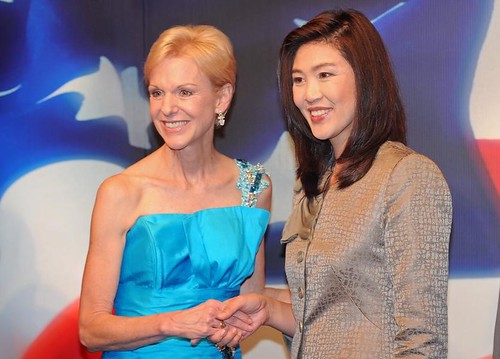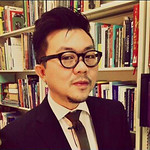The coup was staged on 22 May—it is the 19th coup since Thailand abolished its absolute monarchy in 1932. While domestic pressure has been built up against the coup, international community has also kept a watchful eye on what has happened in Thailand.
Here, the role of the United States toward the coup is crucial. Both the State Department and the American Ambassador in Bangkok, Kristie Kenny, came out to express their grave concern of the political situation in Thailand, particularly the continued crackdowns on the anti-coup protesters, both on the streets of Bangkok and in cyberspace. Meanwhile, many pro-coup individuals in Thailand have turned against Ambassador Kenny, accusing her of interference in the Thai affairs and seeking to petition to have her kicked out the kingdom.

US Ambassador Kristie Kenny and (Former) Thai Prime Minister Yingluck Shinawatra
On the surface, thus, it seems that the United States detests the coup and dares to stand up to defend democracy in Thailand. However, it might be to soon to congratulate the American efforts in condemning the coup makers. At the end of the day, there is no clear sign that the United States has seriously promoted long-term democratisation in the country. History only tells us that the intimate ties between the US government and the Thai army since the Cold War may serve to create an illusion about America’s anti-coup agenda in the eyes of many Thais.
For one thing, The United States has never been fond of former Prime Minister Thaklsin Shinawatra. For the United States, Thaksin’s lack of good governance, ranging from his hard-nosed measures against Thai Muslims in the south, to the widespread extra-judicial killings of drug suspects in 2003, has been a much-talked about topic in Washington. Yet, ironically, the United States has never applied the same moral criterion against countless attempts of the Thai traditional elites to obliterate the people’s confidence in the electoral process.
Many in the current Obama administration might still remember when Thaksin called Washington a “useless friend” after a State Department report criticised his government’s human rights record. To put it crudely, for the first time since the Cold War, both the Thai traditional elites and the American government seemed to have found a common threat; this time it was not the communists, but Thaksin.
At a deeper level, Washington perceived Thaksin’s rise to power and his determination to alter the political consensus as a threat to its own power interests in the kingdom. This explained why in the aftermath of the military coup of 2006 that ousted Thaksin’s elected government, the United States was remarkably quiet. Although all military aid given to the Thai army was suspended, the annual Cobra Gold military exercise between the United States and Thailand continued.
In fact, the coup was staged while Thaksin was attending the UN General Assembly in New York. Upon learning about the coup, the State Department released a brief statement saying, “We hope the people of Thailand resolve political differences by peaceful means.” The United States did not offer Thaksin political sanctuary. He left New York for London on 20 September, one day after the coup.
Then-US ambassador Ralph Boyce was the first Bangkok-based diplomat or American high-ranking official to meet with military-appointed Prime Minister General Surayud Chulanont who had been a former army commander. It is therefore unsurprising that the Department of State, on 4 October 2006, issued a statement that acknowledged the appointment of General Surayud and the promulgation of an interim constitution, while cautioning the restrictions on civil liberties.
But this and earlier statements were regarded as “gentle” in comparison with the US’s harsher responses to other military regimes elsewhere in the world. Bilateral ties continued as though the military coup had not occurred. The Cobra Gold kicked off in Pattaya on 8 May 2007. This annual military exercise is the core platform that strengthens relations between the American and Thai armed forces.
The Deputy Chief of Mission of the US Embassy in Bangkok, Alexander Arvizu, said at the opening ceremony of the Cobra Gold 2007, “For a quarter century, Cobra Gold has been the most visible symbol of US and Thai military cooperation.” The uninterrupted military exercise acted to symbolise the ongoing US’s support for the military and the powerful elites in Bangkok in spite of the fact that they had staged a military coup eight months before.
From the military coup in 2006 to the May crisis of 2010, the United States released a handful of statements, most of which voiced the typical disquiet about the rise of violence at the hands of the red-shirted UDD. The United States may have disapproved of the actions of the yellow-shirted People’s Alliance for Democracy (PAD) in occupying Bangkok’s two airports. Its statement may have indicated that seizing airports was not an appropriate means of protest. But the United States also said that it respected the right to freedom of expression.
The red-shirted movement felt that the United States has done nothing to support Thailand’s democracy or to condemn the existence of double standards and social injustice. In March 2010, the red-shirted protesters submitted a letter to the US Embassy requesting the United States to clarify the report that Thaksin was eavesdropped by US intelligence officials who warned the Abhisit government against possible sabotage during the red-shirts’ rally, supposedly at the order of Thaksin.
It was reported that the American diplomats even accused UDD leaders of stockpiling arms at their protest sites even while they were insisting that their movement was pro-democracy and peaceful. “If the United States interpreted events more carefully, it would see the true evidence”, said Weng Tojirakarn, UDD co-leader now held on potential terrorism charges. The red-shirts were convinced that the United States was working with the military and the traditional elites in isolating Thaksin and discrediting the UDD.
On 12 April 2010, Secretary of State Hillary Clinton called for a peaceful dialogue in Thailand following the first clashes between the red-shirted protesters and the security forces, resulting in 11 dead—9 UDD supporters and 2 soldiers. She sent her video message, which was essentially banal and diplomatic, urging all sides to seek agreement on a way forward that solidified Thailand’s democracy and the rule of law. She also stressed, “While you continue on the path to resolve your political differences, we remain confident in the strong, enduring bonds between the United States and Thailand.”
But in the aftermath of the arson attacks against public property by some members of the red-shirts on 19 May 2010, the State Department spokesman launched what was deemed as the strongest denunciation against the UDD so far:
I would like to say that the United States deeply deplores the violence and loss of life that has resulted from clashes between security forces and protests from the United Front for Democracy Against Dictatorship (UDD)...We are deeply concerned that Red Shirt supporters have engaged in arson targeting the electricity infrastructure and media outlets and have attacked individual journalists...We condemn such behaviour and call on UDD leaders and affiliated opposition politicians to urge their supporters to stop such acts. We remain very concerned about the situation in Thailand and we will continue to monitor those events closely.
This shows that even the American policy towards the Thai political conflict has been perceived as biased. The practice of double standard on the part of the United States will help us explain the current position of Washington toward the coup that removed Prime Minister Yingluck Shinawatra from power.
 Pavin Chachavalpongpun is Associate Professor at the Center for Southeast Asian Studies, Kyoto University
Pavin Chachavalpongpun is Associate Professor at the Center for Southeast Asian Studies, Kyoto University
Read: American Position vis-à-vis Thai Coup: Illusion Part Two

